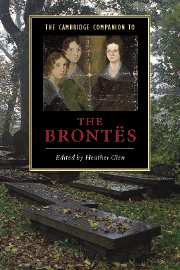Book contents
- Frontmatter
- Introduction
- 1 The Haworth context
- 2 'Our plays': The Brontë Juvenilia
- 3 The poetry
- 4 'Three distinct and unconnected tales': The Professor, Agnes Grey and Wuthering Heights
- 5 'Strong family likeness': Jane Eyre and The Tenant of Wildfell Hall
- 6 Shirley and Villette
- 7 'Getting on': ideology, personality and the Brontë characters
- 8 Women writers, women's issues
- 9 The Brontës And Religion
- 10 The Brontë myth
- Further reading
- Index
- Series List
5 - 'Strong family likeness': Jane Eyre and The Tenant of Wildfell Hall
Published online by Cambridge University Press: 28 May 2006
- Frontmatter
- Introduction
- 1 The Haworth context
- 2 'Our plays': The Brontë Juvenilia
- 3 The poetry
- 4 'Three distinct and unconnected tales': The Professor, Agnes Grey and Wuthering Heights
- 5 'Strong family likeness': Jane Eyre and The Tenant of Wildfell Hall
- 6 Shirley and Villette
- 7 'Getting on': ideology, personality and the Brontë characters
- 8 Women writers, women's issues
- 9 The Brontës And Religion
- 10 The Brontë myth
- Further reading
- Index
- Series List
Summary
Jane Eyre is today a classic, canonical text, beloved of generations of readers. A passionate, headstrong narrative of a young woman confronting the world with obstinate integrity, it treats of marginality and loneliness, of the desire for adventure, intimacy and independence. Its heroine confronts myriad dangers and oppressions but survives to tell a tale of triumph and even revenge. Advertising itself as an autobiography – the title-page of the first edition reads Jane Eyre: An Autobiography edited by Currer Bell – it draws generically also on romance and quest narrative, fairy tale, the gothic novel, and the Bildungsroman. Densely allusive, it reflects its author's familiarity with the Bible, Milton and Shakespeare, and with works as diverse as Pilgrim's Progress and The Arabian Nights.Anne Brontë's The Tenant of Wildfell Hall is by comparison an obscure text. Though recently it has claimed the interest of feminist scholars for its focus on marital abuse and child custody, it has, in the one-hundred-and-fifty years since its publication, been neither well known nor well loved. Its dual narrative – the heroine's private diary framed by letters from her second husband to his brother-in-law – is often considered clumsy; its subject – a bad marriage and its consequences – depressing or uncongenial. The novel's frame of reference is religious rather than psychological; the Bible its most frequently quoted text. The heroine of The Tenant endures the degrading ordeal of her first marriage with piety and stoicism, trying to remain focused on doing her duty as she worries about her abusive husband's tainting and corruptive influence, even on herself. Only when she judges that maternal supersedes wifely duty does she flee him, abducting her child and hiding out in a distant county. The temperature of these texts, metaphorically speaking, is very different.
- Type
- Chapter
- Information
- The Cambridge Companion to the Brontës , pp. 99 - 121Publisher: Cambridge University PressPrint publication year: 2002
- 5
- Cited by



